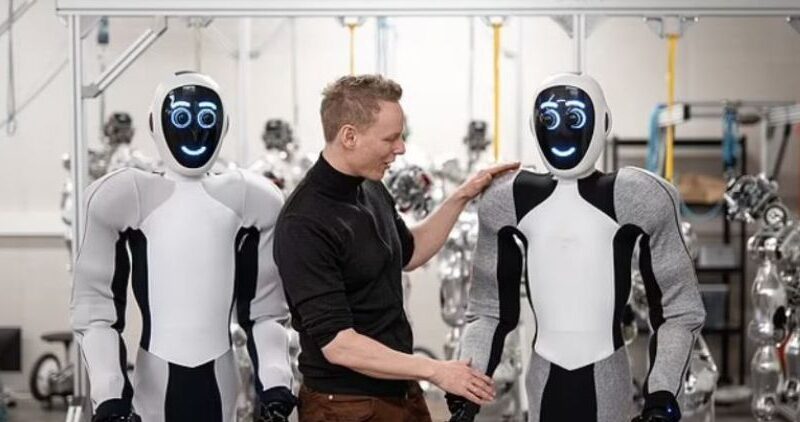The emergence of AI-powered robots is a threat to both white-collar and blue-collar jobs. ChatGPT and its ilk are just the beginning. As AI technology continues to develop, robots will become more and more capable of performing tasks that are currently done by humans.
To put some context, humanoid robots equipped with cutting-edge AI minds are predicted to disrupt the global labour market. When such humanoids begin functioning, they will not be nearly as evolved as humans.
However, if the last few months of generative AI are any indicator, they will learn quickly. The market for humanoid robotics is expected to reach $17.3 billion by 2027.
In one such example of deployment of robots in the real world, 1X, a robotics startup backed by OpenAI, has beaten Elon Musk’s Tesla in deploying the world’s first AI-powered humanoid robot in a professional environment. The Norway-based Humanoid robotics company’s 1X’s robot, EVE, is currently working as a security guard at two industrial sites in Europe and the United States. EVE is capable of performing a variety of tasks, including patrolling, opening doors, and picking up objects.
EVE-The multitasker
Notably, these robots are already patrolling as security guards, and plans are in the works to deploy them in assisted living homes and hospices in the near future. According to Firstpost, the robot is also a good nurse and bartender.
EVE, which has been active since April of this year, has exceeded initial expectations. EVE has set a historical milestone by smoothly integrating into a professional atmosphere, leaving Musk’s widely anticipated Tesla robots in the dust.
A real-life RoboCop, the robot comes with a head, a face, and two autonomous arms. It can accomplish a variety of human-like duties, such as opening doors and windows, retrieving stuff, packing goods, and so on.
Bornich, the CEO of 1X, believes that the humanoid will alleviate labour shortages by replacing human jobs. His vision is of a society where there is no labour shortage and renewable energy can be transformed into any product or service we desire. He also believes that these robots will be used in elderly care in the near future.
Bornich anticipates this to happen within the next five to ten years, which corresponds to the timescale anticipated by OpenAI earlier this week.
Starting with security-related activities, each action taken by EVE adds to system training, allowing the robot to enhance task execution without the need for human interaction, according to 1X. 1X received $23.5 million in funding from OpenAI’s Startup Fund to construct robots as well as advanced language models that allow robots to interpret and execute commands.
During their most recent shareholder meeting, Tesla gave an update on their humanoid robot programme, Optimus. Surprisingly, the robots were seen walking around the company’s premises. “Optimus stuff is extremely underrated,” Elon Musk remarked during the presentation, adding that in the future, the world may have two robots for every person.
Robots like EVE, Neo, and Optimus paint a picture of a future in which human-like machines augment our capabilities and change the way we engage with technology. The future of artificial intelligence is here, and it’s altering the game.















